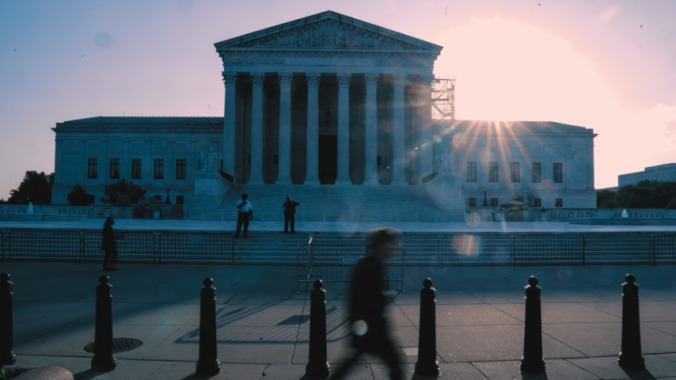The Supreme Court Could Block Gender-Affirming Care Next—Thanks to Dobbs
SCOTUS is set to hear a case on whether minors in the state can receive gender-affirming health care—and Tennessee’s attorneys argue the same ruling that killed Roe v. Wade should allow them to target trans youth.
Photo: Getty Images Politics The Supreme Court
The Supreme Court began its new nine-month term on Monday and lived up to its reputation of creeping fascism, first by siding with Texas and allowing the state to continue denying life-saving, emergency abortion care—and then, by accepting a new case that wields the Dobbs v. Jackson Women’s Health ruling to argue for a ban on gender-affirming health care in Tennessee.
In March 2023, Tennessee Governor Bill Lee signed SB 1, which prohibits health care workers from providing gender-affirming health care to transgender youth, including puberty blockers and hormone replacement therapies. (Minors who aren’t trans are still allowed to receive these treatments.) SB 1, which forced trans youth to end their care by March, 31, 2024, also allows minors or their parents to sue trans health care providers if they’ve suffered “harm” following treatment.
Then, in April 2023, in order to block SB 1, the American Civil Liberties Union, Lambda Legal, and the law firm Akin Gump Strauss Hauer sued Tennessee and the state’s attorney general, Jonathan Skrmetti, on behalf of one doctor and three families of trans youth. In June 2023, a federal judge issued a decision that would have blocked the law, but Tennessee immediately filed a successful appeal. The U.S. Court of Appeals for the Sixth Circuit then allowed the law to go into effect on July 8, 2023—which, according to the New York Times, was the first time a federal court ruled that a ban on gender-affirming care could be constitutional. On June 24, the Supreme Court agreed to take on U.S. v. Skrmetti and will hear arguments in either December or January, per the ACLU.
-

-

-

-

-

-

-

-

-

-

-

-

-

-

-

-

-

-

-

-

-

-

-

-

-

-

-

-

-

-

-

-

-

-

-

-

-

-

-

-








































